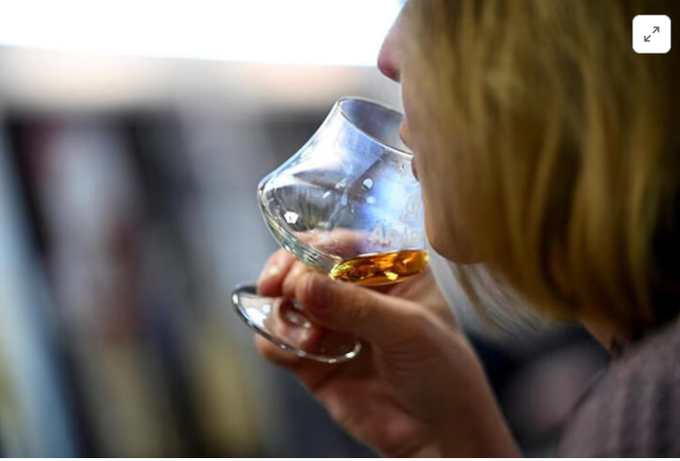May 22, 2025 | 00:55 GMT +7
May 22, 2025 | 00:55 GMT +7
Hotline: 0913.378.918
May 22, 2025 | 00:55 GMT +7
Hotline: 0913.378.918

A woman drinks brandy during the International Green Week agriculture fair in Berlin, Germany, January 19, 2024.
Chinese drinkers may pay more for Remy Martin and other European brandies after the government announced on Tuesday provisional tariffs of 30.6% to 39% on those liquors, four days after a majority of European Union countries approved duties on electric vehicles made in China.
The tit-for-tat move potentially gives Chinese negotiators leverage in talks with the EU on reducing or eliminating the tariffs of up to 35.3% on Chinese EVs, which would take effect at the end of this month.
The brandy tariffs are provisional and require importers to make a deposit with the Chinese customs agency for the amount of the tariff, starting Friday.
The announcement followed a preliminary finding by China's Commerce Ministry in late August that European brandy was being dumped in China, threatening “substantial damage” to domestic producers.
China has opened a series of anti-dumping investigations into European brandy, pork and dairy products as a now year-old EU investigation into Chinese EV exports has progressed through various stages.
The brandy probe was the first and targeted mainly French makers of cognac and similar spirits such as Armagnac. France has supported the investigation into Chinese-made EVs, while Germany, whose automakers fear retaliation in the Chinese market, has opposed it.
China is studying whether to raise tariffs on imported cars with large engines, a Commerce Ministry spokesperson confirmed Tuesday in an online report from state broadcaster CCTV.
The provisional tariffs on brandy vary by brand, similar to the EU duties on electric cars made in China. For example, Martell products face a 30.6% tariff versus 38.1% for Remy Martin and 39% for Hennessey. The tariffs are being imposed on dozens of companies, including some Spanish makers.
French President Emmanuel Macron presented Chinese leader Xi Jinping with two bottles of cognac when the two exchanged gifts during Xi's state visit to France in May.
In a statement, the European Commission accused China of abusing the rules governing world trade and said that it would help its producers to weather the impact of the measures.
“The EU takes with utmost seriousness any unfair use of trade defense instruments against any sector of our economy,” said the commission, which manages trade on behalf of the 27 member countries.
“Abuse of trade defense for inappropriate reasons is a clear breach of WTO rules,” it said, and warned that it would “robustly challenge” the move at the World Trade Organization.
“In parallel, the commission will now carefully identify and assess all possibilities to offer appropriate support to EU producers facing the negative impact of this unwarranted decision by the government of China,” it added.
(ABCNews)

(VAN) Attempts to bring down the price of the Japanese staple have had little effect amid a cost-of-living crisis.

(VAN) Fourth most important food crop in peril as Latin America and Caribbean suffer from slow-onset climate disaster.

(VAN) Shifting market dynamics and the noise around new legislation has propelled Trouw Nutrition’s research around early life nutrition in poultry. Today, it continues to be a key area of research.

(VAN) India is concerned about its food security and the livelihoods of its farmers if more US food imports are allowed.

(VAN) FAO's Director-General emphasises the need to work together to transform agrifood systems.

(VAN) Europe is facing its worst outbreak of foot-and-mouth since the start of the century.

(VAN) The central authorities, in early April, released a 10-year plan for rural vitalization.